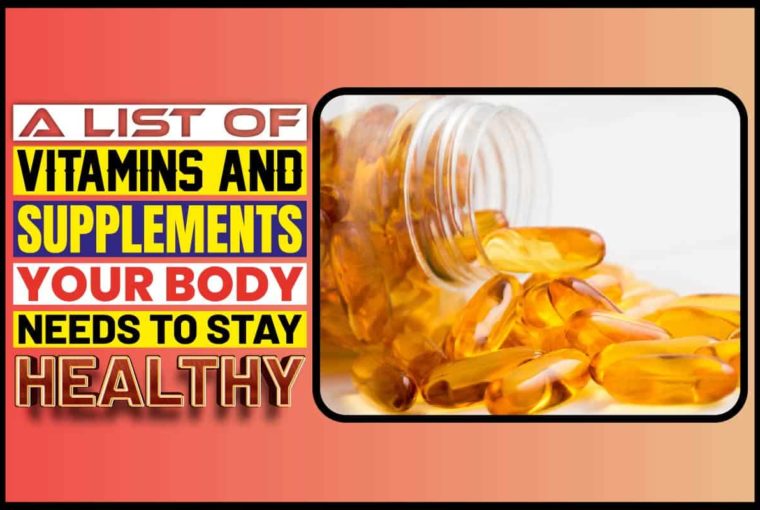In order to have a healthy body, vitamins and supplements need to be taken each day. Vitamins are not stored as energy within the body as more often believed, they aid in reactions that take place in the body, such as converting food into energy. Here is a list of the most important vitamins and supplements your body needs to stay healthy.
1. Omega 3
Omega 3 fatty acids are an important supplement that everyone needs to take. This is because the human body cannot produce Omega 3 on its own, and there is no other way to get these acids. Omega 3 can be found in nuts, seeds, oils, meats; pretty much everything you eat has some omega 3 fatty acids in it. The benefits of taking Omega 3 supplements are less risk for heart disease and stroke. If you don’t like using vitamins one by one, you can get a multivitamin pill, which also works. There are pure encapsulations O.N.E. multivitamin pills that are produced using only pure ingredients that are third-party tested to ensure potency and purity. Their pure vitamins and pure supplements do not contain magnesium stearate, binders, artificial colors, flavors, sweeteners, preservatives, trans fat, GMO, or other unnecessary ingredients.
2. Vitamin D
Vitamin D is another important supplement that everyone needs to take on a daily basis. Vitamin D is not produced naturally by the body; it is actually formed when the skin absorbs sunlight. It’s also found in oily fish like salmon or tuna, but most people cannot consume this much fish, so they will have to take vitamin D supplements instead. There are many health benefits associated with having enough vitamin D in your system, including healthy bones and teeth, cancer prevention, and protection against Alzheimer’s disease.
3. Vitamin C
Who doesn’t want to have a strong immune system that combats sickness? In order for this to occur, it is necessary to take vitamin C daily. Vitamin C can be found in many fruits and vegetables as well as supplements of course, which you can buy online or at a local drugstore. Some benefits associated with having enough vitamin C in your body include healthy teeth and gums, a strong immune system, and cancer prevention.
4. Calcium-Magnesium Supplement
These two minerals work together, but they also need to be taken separately from each other, since our bodies do not absorb them when they are combined into one pill form. Calcium is needed for the formation of strong bones and teeth, so even though it is mainly associated with women, men need calcium too. Specific foods that are packed full of calcium include kale, seaweed, broccoli, spinach, etc. Magnesium aids in quick body response times as well as helping to control blood sugar levels, which means regular exercise because it also helps our heart by pumping blood more efficiently through our system. It can be found in nuts like almonds or cashews, or alternatively, you could take supplements.
5. Vitamin B Complex
Vitamin B complex is actually a mixture of 8 different vitamins; thiamine (B1), riboflavin (B2), niacin (B3), pantothenic acid (B5), pyridoxine (B6), biotin, folate, and cobalamin (B12). B vitamins are needed by the body for energy production, so when someone is tired and lacking motivation, they could be deficient in B vitamins. They can also help with hormone functions, metabolism, and moods. Vitamin B complex can be found naturally in many foods such as bananas, potatoes, legumes like chickpeas, and lentils, or alternatively, you could take supplements to get your daily intake of this vitamin group.
6. Chromium
Chromium is a mineral that works as an insulin regulator and blood sugar balancer. Chromium can be found in foods such as broccoli. Blood sugar levels must be balanced for the body to function healthily, so it’s important to take chromium supplements or eat foods high in chromium if your glucose levels tend to fluctuate throughout the day.
7. Zinc-Copper Supplement
Zinc and copper work together, so if you want to absorb more of these minerals, it would be best to take them together as a supplement. Zinc is needed for healthy immune system function, so if someone was deficient in zinc, they could become sick very often or get wounds that take a long time to heal. Copper on the other hand assists with wound healing and tissue repair, which means this mineral pair works great together when taken daily because of their bond within the body. Foods that are high in zinc include meat such as beef or chicken and shellfish like oysters or lobster. Copper can be found in foods like beans, dark leafy greens, and mushrooms, etc.
8. Iron Supplement
Iron is needed for healthy red blood cells. This mineral can be found in fish like tuna or sardines as well as leafy green vegetables like kale, spinach, etc. If someone is deficient in iron, they may become tired very easily, struggle with brain fog or have trouble focusing on tasks. In order to counter these symptoms, they should take an iron supplement or eat foods high in iron.
9. Flaxseed Oil Supplement
Essential fatty acids, Omega 3 and 6 are fats that the body can’t produce so a healthy diet rich in a variety of vegetables, nuts, and seeds will provide enough EFAs for good health but if someone is having trouble with inflammation issues it would be beneficial for them to add a supplement to their daily intake since most people don’t get enough of this type of oil from their diets. Fatty acids help with brain function as well as heart disease prevention.
To help support the health of your gut microbiome and immune system, check Gundry MD Bio Complete 3 reviews.
Why Are Vitamins So Important For Our Life?
Vitamins are compound organic substances that we must take through the diet because our bodies cannot make them. They assist your metabolism and help to keep us healthy by producing enzymes (chemicals that trigger chemical reactions such as the processing of nutrients), increasing or inhibiting enzyme activity, and stimulating growth. We need vitamins to stay healthy, and without enough every day we could become unwell.
There is a lot of misinformation surrounding vitamins, so it’s important to note that just because something has a vitamin in its name doesn’t mean it contains enough vitamins for good health!
Fruits and vegetables for example don’t have a high enough vitamin content to meet our daily needs. If someone doesn’t eat many fruits and veggies, it would be good for them to take a supplement that contains vitamins from these foods instead of taking a multivitamin, which doesn’t contain the complete set of essential nutrients needed by humans.
Vitamins and supplements play an important role in keeping humans healthy, for this reason, it’s important to make sure to eat a variety of foods high in vitamins and minerals each day along with taking multivitamins or supplements containing essential nutrients that are primarily found in fruit and vegetables. Remember, a healthy body is a healthy mind!




